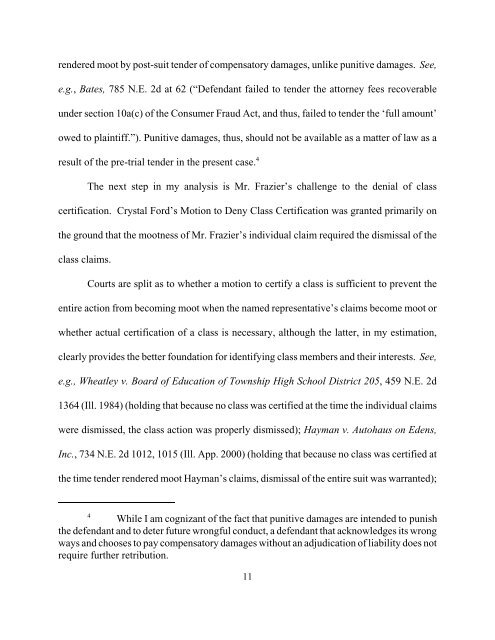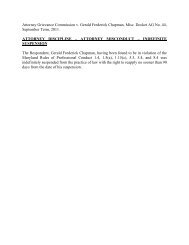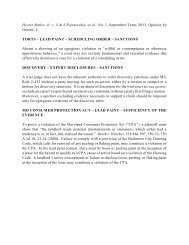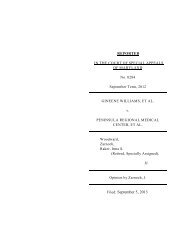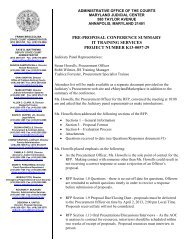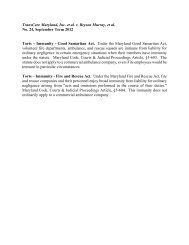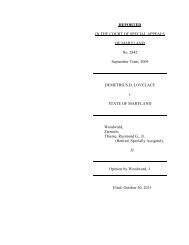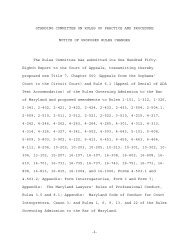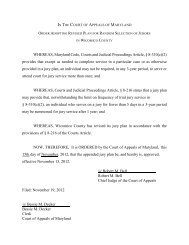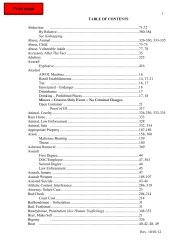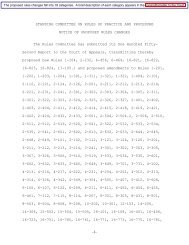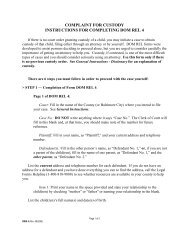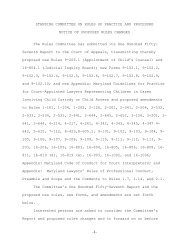Anthony M. Frazier v. Castle Ford, Ltd., f/k/a ... - Maryland Courts
Anthony M. Frazier v. Castle Ford, Ltd., f/k/a ... - Maryland Courts
Anthony M. Frazier v. Castle Ford, Ltd., f/k/a ... - Maryland Courts
You also want an ePaper? Increase the reach of your titles
YUMPU automatically turns print PDFs into web optimized ePapers that Google loves.
endered moot by post-suit tender of compensatory damages, unlike punitive damages. See,<br />
e.g., Bates, 785 N.E. 2d at 62 (“Defendant failed to tender the attorney fees recoverable<br />
under section 10a(c) of the Consumer Fraud Act, and thus, failed to tender the ‘full amount’<br />
owed to plaintiff.”). Punitive damages, thus, should not be available as a matter of law as a<br />
result of the pre-trial tender in the present case. 4<br />
The next step in my analysis is Mr. <strong>Frazier</strong>’s challenge to the denial of class<br />
certification. Crystal <strong>Ford</strong>’s Motion to Deny Class Certification was granted primarily on<br />
the ground that the mootness of Mr. <strong>Frazier</strong>’s individual claim required the dismissal of the<br />
class claims.<br />
<strong>Courts</strong> are split as to whether a motion to certify a class is sufficient to prevent the<br />
entire action from becoming moot when the named representative’s claims become moot or<br />
whether actual certification of a class is necessary, although the latter, in my estimation,<br />
clearly provides the better foundation for identifying class members and their interests. See,<br />
e.g., Wheatley v. Board of Education of Township High School District 205, 459 N.E. 2d<br />
1364 (Ill. 1984) (holding that because no class was certified at the time the individual claims<br />
were dismissed, the class action was properly dismissed); Hayman v. Autohaus on Edens,<br />
Inc., 734 N.E. 2d 1012, 1015 (Ill. App. 2000) (holding that because no class was certified at<br />
the time tender rendered moot Hayman’s claims, dismissal of the entire suit was warranted);<br />
4<br />
While I am cognizant of the fact that punitive damages are intended to punish<br />
the defendant and to deter future wrongful conduct, a defendant that acknowledges its wrong<br />
ways and chooses to pay compensatory damages without an adjudication of liability does not<br />
require further retribution.<br />
11


